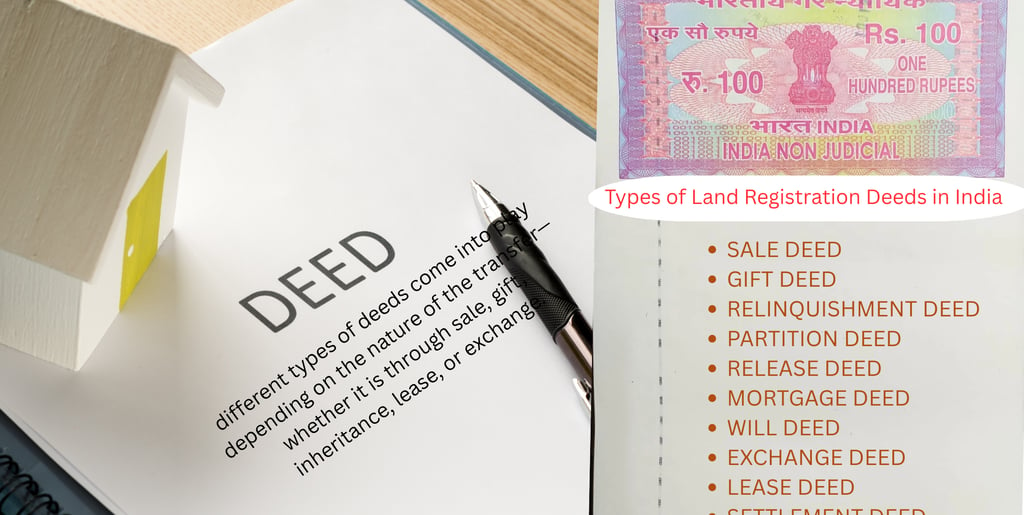Types of Land Registration Deeds in India: A Complete Guide
Buying or selling land in India involves a series of legal procedures. One of the most critical steps is land registration, which makes the buyer the lawful owner of the property. This process is carried out under the Registration Act, 1908, and ensures that the transaction is transparent, authentic, and legally binding. During registration, different types of deeds come into play depending on the nature of the transfer—whether it is through sale, gift, inheritance, lease, or exchange.
FLIXAHDEVELOPERS PVT LTD
9/3/20255 min read


Types of Land Registration Deeds in India: A Complete Guide
Buying or selling land in India involves a series of legal procedures. One of the most critical steps is land registration, which makes the buyer the lawful owner of the property. This process is carried out under the Registration Act, 1908, and ensures that the transaction is transparent, authentic, and legally binding.
During registration, different types of deeds come into play depending on the nature of the transfer—whether it is through sale, gift, inheritance, lease, or exchange. Understanding these deeds is essential for anyone dealing with land transactions in India.
In this blog, we will explore the various types of land registration deeds, their features, and their importance in real estate transactions.
What is a Land Registration Deed?
A land registration deed is a legal document that records the transfer of ownership, rights, or interests in a piece of land. It serves as proof of ownership and protects the parties involved from future disputes. Once registered, these deeds are part of public records and can be verified by anyone.
The main objective of registering deeds is to:
Establish legal ownership.
Prevent fraud or disputes.
Maintain transparency in property transactions.
Provide evidence in case of legal conflicts.
Types of Land Registration Deeds in India
Let’s go through the most common types of land registration deeds in detail:
1. Sale Deed
A Sale Deed is the most common type of land registration deed. It is executed when the owner of a property sells it to another person for a price.
Key features:
Legally transfers ownership of land from seller to buyer.
Must be compulsorily registered under the Registration Act, 1908.
Contains details like seller and buyer information, property description, sale consideration, and terms of transfer.
Once registered, it becomes legal proof of ownership.
When is it used?
Whenever land is sold in exchange for money.
we have already wrote a full article on SALE DEED you can visit the page and read the blog get the all the neccesary info about sale deed there.
2. Gift Deed
A Gift Deed is executed when land or property is transferred voluntarily by the owner (donor) to another person (donee) without any monetary exchange.
Key features:
Transfer is done without consideration (no money involved).
Must be registered for immovable property to be valid.
The donee must accept the gift during the donor’s lifetime.
Often used for transfers within families (parents to children, grandparents to grandchildren, etc.).
When is it used?
For gifting property to relatives, loved ones, or even charitable institutions.
3. Relinquishment Deed
A Relinquishment Deed is executed when a co-owner of a property willingly gives up their share in the property to another co-owner.
Key features:
Common in cases of inherited property among siblings or family members.
Must be registered to have legal validity.
Clearly specifies the share being relinquished and the beneficiary co-owner.
When is it used?
When one heir or co-owner wants to transfer their share to another co-owner, often for simplifying ownership.
4. Partition Deed
A Partition Deed is executed when co-owners decide to divide a jointly owned property among themselves.
Key features:
The property is divided according to ownership rights.
Each co-owner gets a specific share with independent ownership rights.
Must be registered if the property is immovable.
Helps in avoiding disputes in joint family properties.
When is it used?
When siblings, family members, or partners want to split property into individual portions.
5. Release Deed
A Release Deed is similar to a relinquishment deed but is often used in the context of releasing rights or claims in favor of another co-owner.
Key features:
Usually executed among family members.
Transfers rights without monetary consideration.
Must be registered to avoid future disputes.
When is it used?
When one family member wants to give up his/her share in property to another family member.
6. Exchange Deed
An Exchange Deed is executed when two parties agree to exchange properties with each other.
Key features:
Both movable and immovable properties can be exchanged.
Must be registered if immovable property is involved.
Stamp duty is payable on the market value of the property exchanged.
When is it used?
When property owners exchange their properties instead of selling them.
7. Mortgage Deed
A Mortgage Deed is executed when property is used as security for a loan.
Key features:
The borrower mortgages property to the lender as collateral.
Ownership rights remain with the borrower but the lender gets a charge on the property.
Must be registered to be enforceable.
When is it used?
When taking loans against property.
8. Lease Deed
A Lease Deed is executed when a property is rented or leased for a fixed period in exchange for rent.
Key features:
Transfers the right to use the property but not ownership.
Lease period, rent, and terms are specified in the deed.
Must be registered if the lease is for more than 12 months.
When is it used?
For renting land or property for residential, commercial, or agricultural purposes.
9. Will Deed
Although technically not a transfer during a person’s lifetime, a Will Deed specifies how property will be distributed after the death of the owner.
Key features:
Comes into effect only after the testator’s death.
Registration is not mandatory but highly recommended.
Helps avoid inheritance disputes.
When is it used?
For distributing property among heirs after the death of the owner.
10. Settlement Deed
A Settlement Deed is executed to distribute property among family members either during the lifetime of the owner or after their death.
Key features:
Often used for family arrangements.
Reduces chances of disputes.
Must be registered to be valid.
When is it used?
When a property owner wants to settle property rights among heirs in advance.
Importance of Registering Land Deeds
Many people assume that signing a deed is enough, but in India, registration is mandatory for immovable property transactions.
Benefits of registration:
Provides legal proof of ownership.
Protects against fraud and multiple claims.
Ensures property details are part of public record.
Provides admissible evidence in court.
Without registration, a deed has no legal standing in disputes.
Conclusion
Land transactions in India involve various types of deeds—sale, gift, lease, mortgage, partition, exchange, release, settlement, and more. Each serves a different purpose and must be executed carefully to avoid future legal issues.
Among these, the Sale Deed is the most common, while others like Gift Deed, Relinquishment Deed, and Partition Deed play vital roles in family property matters. Regardless of the type, registration is crucial to ensure that the transaction is legally valid and binding.
If you are planning to buy, sell, gift, or transfer land, consult a legal professional to choose the right deed and complete the registration process properly. Doing so will give you peace of mind and protect your ownership rights.
for more info on each and every type of DEED in detail please subscribe our website flixahdeveloperspvtltd.com


